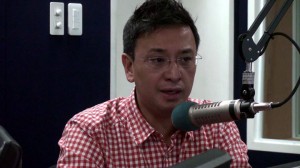MANILA, Philippines — More salary earners pay the bulk of the total income tax collection of the country in 2013 despite rising prices of goods, a lawmaker belonging to the majority group said on Wednesday as he pushed for lower income tax rates in the House of Representatives.
During the ways and means committee hearing on Wednesday, panel chairman Marikina Representative Romero “Miro” Quimbo said at least 16 percent of total individual income earners pay for the 85 percent of total individual income tax collection in 2013.
“Minority of income tax earners pay for majority of income tax payments. These are mostly salaried and wage earners who automatically have to pay income taxes,” Quimbo said.
He also said that in 2013, 72 percent of all income taxes is paid by the middle class.
Meanwhile, “the highest income earners shoulder a smaller portion of tax payments, which is less than ideal in terms of equity,” Quimbo said.
The self-employed professionals and non-professionals also stand to gain because of low participation rate from the income tax collection, Quimbo said.
He said only 51 percennt of self-employed professionals paid any direct tax, while 29 percent of self-employed non-professionals paid any direct tax.
Quimbo also warned of a “bracket creep” phenomenon when workers’ salaries increase according to inflation while tax brackets remain unadjusted since 1997, when the tax code was passed.
“Therefore, many workers have been classified into higher tax brackets with higher tax rates,” Quimbo said.
The lawmaker scored the Bureau of Internal Revenue for going after the “small fishes” instead of the “sharks.”
“The BIR is going after the small fish which are already trapped in fishpens. How about the massive sharks who do not pay?” Quimbo said.
“That’s why the ordinary workers bear the brunt because tax collection is heavily reliant on them,” he added.
According to Quimbo’s House Bill 4829, the levels of taxable income brackets and the corresponding base amount of tax for compensation income earners will be adjusted based on Consumer Price Index (CPI).
Quimbo said his bill also proposes a flat rate of 25 percent income tax on self-employed individuals and professionals, and a five percent minimum income tax rate on self-employed individuals and professionals, as well as reduces the corporate income tax (CIT) rate from 30 percent to 25 percent and increases the minimum corporate income tax (MCIT) rate from two percent to five percent.
The panel vowed to expedite the passage of a consolidated lower tax rates bill. At least nine similar bills remain pending in the committee for consolidation.
In a column published in the Philippine Daily Inquirer, Senator Sonny Angara wrote that “the Philippines has some of the highest taxes in Southeast Asia, not to mention one of the highest value-added tax (VAT) rates at 12 percent.” “Income is taxed at very high percentages and at very low thresholds or amounts and brackets,” wrote Angara, who is also batting for lower tax rates in the Senate.
RELATED STORIES
Overtaxing working, middle classes
Neophyte senator pushes bill reducing income tax rate
